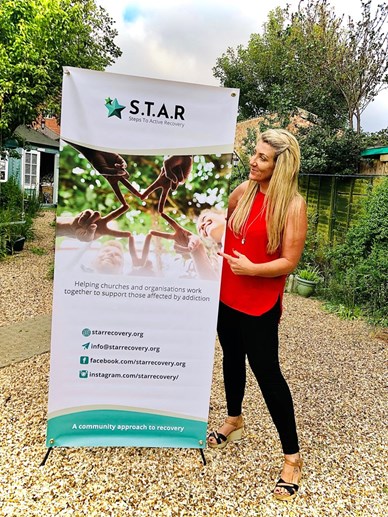WHAT does it mean to live life to the full? And how can this be achieved when you’re also living with an addiction?
These are the questions explored weekly at Sheffield’s first Recovery Church. It is an ecumenical partnership between the Church Army, St Leonard’s, Arbourthorne, and the Salvation Army, led by the Church Army’s lead evangelist in the city, Stephen Ramshaw.
“I’ve worked with homeless people with addictions before, and completed some training in mental health and recovery after realising the problems they faced were complex,” he says.
“One Sunday evening, I was at a homeless shelter where I worked in Kent, and one of the lads told me that Sunday was the worst day of the week for them. They called it ‘Suicide Sunday’, because there was nothing for them to do. So I set up a community church for people struggling with these issues, and, when I moved to Sheffield, in 2022, I realised God was calling me to the same kind of work.
“This time, I began to work in partnership with Steps to Active Recovery [STAR]. They gave us some training, and we started to run their 12-week STAR Life Course.
“Once we started the courses, we realised we needed something for the community of people who have accepted Jesus into their lives, but still want to continue their recovery journey; so, in July 2023, we started Recovery Church.”
The service is known to those who attend as “J 10:10” after John 10.10: “I have come that they may have life and have it to the full.” It’s held in the Anglican church, St Leonard’s, on a Monday evening.
For the first 20 minutes, hot drinks, sandwiches, and biscuits are offered, and then the congregation goes into the church for worship and prayers.
“At 7.20 p.m., we’ll move into the church. I know God is with us in all places, but this is the sacred space. We have a prayer of approach when we enter that space [and] a basic liturgy, because we believe that, for people who have got a bit of chaos in their lives, it’s good to have a bit of structure and order.”
In the church itself, there will be a talk, and then groups go off to discuss and give feedback. Then there’s more worship, prayers, and intercession.
“We’ve had a Recovery Service baptism, and the curate [of St Leonard’s, Arbourthorne] has led communion,” Mr Ramshaw says.
“It’s a place where we don’t want people to be anonymous. We don’t want people to come in and say, ‘OK, yes, I’m fine’; we’re looking for honesty, what’s going on in someone’s life now. We’re there to support each other, love each other, and just do what we can.
“Even someone who is sitting in church thinking they’ve got it all made — they will have struggles. We’re just encouraging the openness of it. We don’t want things hidden away.
“We also understand that everyone there will have [had] some experience, or some struggle, with addiction. During the service, there will be references to people’s struggles and to recovery that may reflect the challenges of overcoming — for example, David and Goliath.”
The service is intentionally relaxed. “If people want to go and have a cigarette, or get up and walk around, if they need to, that’s OK,” Mr Ramshaw says. “People needn’t be embarrassed if they’re not feeling comfortable, as they might do in a traditional service.”
For many who attend, freedom from addiction has meant leaving behind many sources of previous support, including family and friends whose lifestyles are entwined with addictive behaviour; so a new, supportive community is vital for recovery.
One of them said: “I have gone through a lot of things. I have had addictions. . . I was on alcohol, I was on every tablet you could mention . . . and I said to the Lord, ‘I don’t want to keep doing this’ — and God took it. I’m not on anything, now.
“I come here [Recovery Church] because I just like being here. You get a cup of tea, bag of crisps, sandwiches. I just enjoy the company and fellowship of other people.”
The church also seeks to provide practical help with life skills and ongoing support, Mr Ramshaw says. “It’s all about the next step. We saw Jesus give people free food, then he gave them spiritual food. In most towns and cities in the UK, churches and other organisations will provide free food for the homeless. We are trying to take that further with practical, ongoing help: budgeting skills, for example.”
Safeguarding and boundaries are important, he says. “We have rules that I read out when people come in: the importance of confidentiality; allowing others to speak; being mindful of others.”
The church is in contact with 38 people, and there are six or seven regulars. “The work is never going to attract huge numbers,” Mr Ramshaw says. “It’s all about making a real difference in the lives of the people who attend.”
One of those regulars is a woman who “always tells us how many churches she’s been turned away from. ‘Well,’ I told her, ‘you’ve been coming here for a year now. You’ve not been turned away from here.’ It was amazing to see the look on her face when she realised she belonged.
“Life’s beaten people up sometimes,” Mr Ramshaw says, “but they come along and they do get better. Though it’s early days, they realise there is a better way of living, and we’re beginning to see positive change.”
churcharmy.org/be-inspired/infocus/23q4/no-longer-anonymous
EMMA HEATH, the founder of Steps to Active Recovery (STAR), is on a mission to help churches retrain to be able to support communities in addiction recovery.
 Emma HeathThe founder of STAR, Emma Heath
Emma HeathThe founder of STAR, Emma Heath
The charity trains church teams to understand addiction, so that teams can go on to run six- or 12-week STAR Life Courses to support people on their own recovery journey. Individuals can also sign up directly with STAR to take part in an online course.
“STAR was birthed out of a frustration that churches wanted to help, but either they didn’t know how to, or great projects were popping up but didn’t last,” she says.
“I’d run addiction ministries within churches for over a decade, helped by my own experience of addiction. I knew that, if the Church better understood addiction and destructive habits, we could help more people facing the sort of crisis we see around us.
“We’re living in a world where we are programmed to be addicted to things, and research suggests that between 80 to 90 per cent of people have some form of habit, destructive behaviour, or full-blown addiction, that if they were free of they’d be happier.”
STAR became a registered charity in October 2021, and, so far, has trained 14 churches around the country; another 20 are in the pipeline.
“We do believe we can change a culture of how the Church steps in around addiction. A big part of that is dispelling the idea of what addiction is, because despite having lived [my own] life of addiction since the age of 11, I still had preconceptions of what it was.
“In my worst times, I was drinking two litres of vodka a day, and it was very obvious to those around me. But I’ve also met a woman was addicted to cross-stitch, to the point where it was adversely affecting her life and relationships.
“The key thing with addiction is — whether it’s drugs, alcohol, pornography, or shopping — the root cause is the underlying pain that causes them to either avoid life, or numb that pain.
“If we address the root of this, that will help more people. So, having individuals who are experienced in understanding addiction, and breaking the stigma attached to it, is key, before jumping ahead and doing anything.”
The STAR training includes understanding the demographic of where church teams are working, or hope to work. Crucially, it also addresses how to look after the people who will be running the courses. “Because, ultimately, they will make the difference,” Miss Heath says.
There are four levels of support available for church teams. Full membership includes access to online training to deliver the STAR course, further learning and resources. A workshop which includes creating a crisis-support signposting list is also available at this stage.
The highest membership option is STAR Excellence. This package offers advanced addiction awareness training and access to the STAR Prison and Youth programmes, recovery retreats, and access to health and mental-health support.
“The whole point of STAR is to upskill teams and give them that confidence. So, first, they are trained until they are ‘STAR approved’. Only then do they get the resources and further training. It’s a kind of quality assurance that we know that teams have invested in, and are ready to do . . . our life courses with people who are addicted,” Miss Heath says.
The STAR life course looks holistically at issues from a mind, body, and spirit angle, but is not “too heavy” for people who might not have a faith background, Miss Heath says.

















